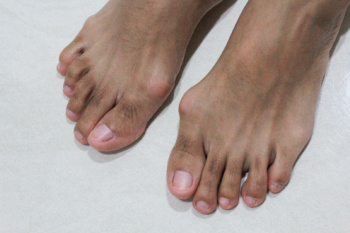
Bunions are common foot deformities involving a bony bump that forms on the joint at the base of the big toe. This causes the top of the toe to angle toward the smaller toes. Such a misalignment can lead to pain, redness, and swelling in the area. Over time, the bunion can worsen and may lead to stiffness or arthritis in the joint. Factors that contribute to bunion formation include abnormal foot mechanics, genetics, and wearing tight or high-heeled shoes. Symptoms can range from mild discomfort to severe pain, making walking and wearing shoes challenging. A lesser-known foot deformity called a bunionette can occur at the base of the pinky toe with similar symptoms. A podiatrist can evaluate the severity of the bunion through clinical examination and imaging tests. Treatment options include custom orthotics for foot support and surgery, if deemed necessary. If you have a painful bunion, it is suggested that you schedule an appointment with a podiatrist.
If you are suffering from bunion pain, contact one of our podiatrists of Fox Valley Foot and Ankle Specialists. Our doctors can provide the care you need to keep you pain-free and on your feet.
What Is a Bunion?
Bunions are painful bony bumps that usually develop on the inside of the foot at the joint of the big toe. As the deformity increases over time, it may become painful to walk and wear shoes. Women are more likely to exacerbate existing bunions since they often wear tight, narrow shoes that shift their toes together. Bunion pain can be relieved by wearing wider shoes with enough room for the toes.
Causes
- Genetics – some people inherit feet that are more prone to bunion development
- Inflammatory Conditions - rheumatoid arthritis and polio may cause bunion development
Symptoms
- Redness and inflammation
- Pain and tenderness
- Callus or corns on the bump
- Restricted motion in the big toe
In order to diagnose your bunion, your podiatrist may ask about your medical history, symptoms, and general health. Your doctor might also order an x-ray to take a closer look at your feet. Nonsurgical treatment options include orthotics, padding, icing, changes in footwear, and medication. If nonsurgical treatments don’t alleviate your bunion pain, surgery may be necessary.
If you have any questions, please feel free to contact our office located in Naperville, IL . We offer the newest diagnostic and treatment technologies for all your foot care needs.
